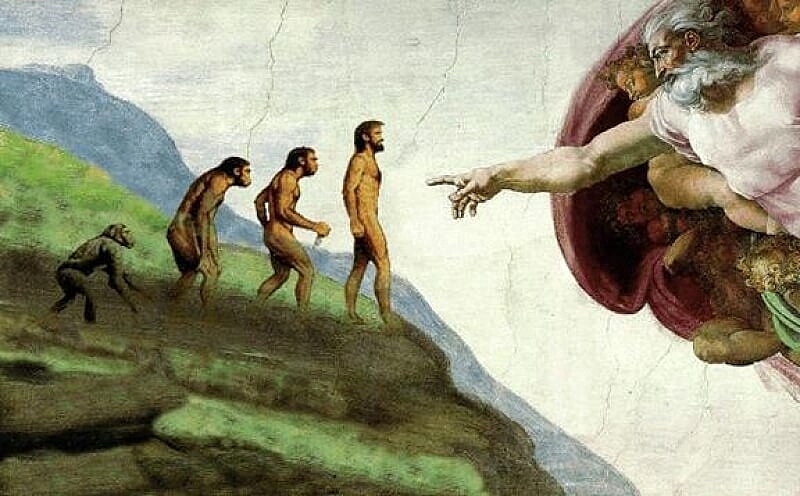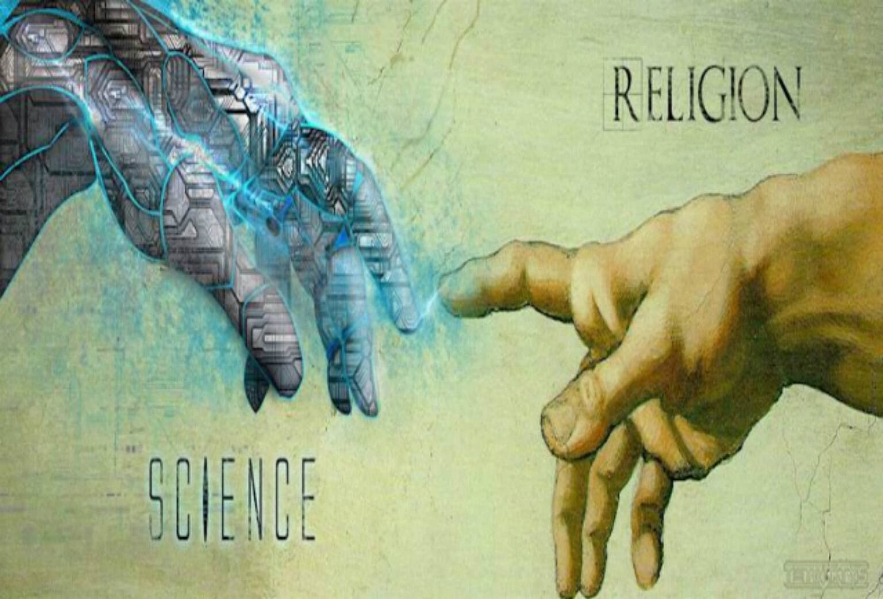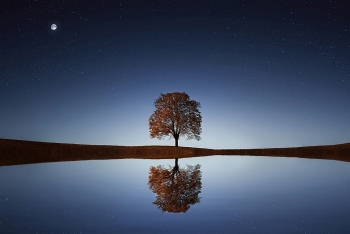Religion and Science Are Both Necessary in Life
 |
| Religion and science in life |
What is Science?
Science focuses on the study of the external physical world with the aim of understanding this world and serving human life.
While the term science is generally used to designate knowledge of the natural world, this slide suggests that original definition was simply knowledge (as opposed to wisdom, which was considered superior). Before the 19th century, many people practiced natural philosophy, which sought to study the natural world, and natural theology, which attempted to use the natural world to learn more about God. Natural philosophy eventually gave rise to physics and science according to its modern definition. It is worth noting that various branches of science have significant differences in their methods, e.g., physicists and chemists can perform controlled experiments, while astronomers and paleontologists must rely on observations.
A Definition of Science
Science in often taught as a collection of facts, but science as practiced consists of problem-solving and investigation.
Most philosophers of science agree that it is impossible to prove anything conclusively in science. If you think about it, scientific proof would entail showing that something happens the same way in all circumstances in the present, the past, and the future. Since the future and past cannot be tested, all statements within science must be considered as being tentatively true. Note that a single instance can disprove a scientific statement.
Empirical knowledge is obtained by the senses. In science the senses are enhanced by microscopes, telescopes, and other forms of technology.
Science seeks to explain the natural world. There is some difference between the definitions of hypothesis, theory, and law, but in general hypotheses are testable statements of a narrow topic. Theories entail a number of hypotheses that are (and have been) tested and have never been disproven. For example, Einstein’s theory of relativity predicted the bending of light as it passes by a large object; the bending was experimentally verified years later exactly as predicted. The term “law” is almost never used for new explanations, perhaps because of the fear that they will be disproved. We speak of Newton’s laws and Einstein’s theory of relativity even though they explain the same things. To some degree, laws are more mathematical than theories. Regardless, a scientific theory describes a powerful explanation rather than a guess.
What is Religion?
Religion focuses on the study of the inner spiritual world with the aim of understanding this world and helping to bring happiness, love, and peace to people.
The Protestant Reformation and increased exposure of Europeans to other religions led believers to justify their religion as the true one. Since science didn’t receive its current definition until the 19th century, religion and science technically couldn’t have been in conflict until the latter date.
A Definition of Religion
Religion is probably harder to define than science if one takes into account all religions.
The supernatural power may be God or gods or forces that act on humans (as in Buddhism).
The institution includes churches and the Church universal as well as religious leaders and the power and influence they exert.
The practices associated with religion serve to unite believers in community, to educate them, and to change their lives in positive ways. The institutions serve to educate leaders and provide resources to make a difference in individual believers, in the community, and in the world.
Religion seeks answers though most believers hold that the answers cannot be known (at least in this world) by mortals. The importance is in the striving toward the answers rather than the answers themselves.
The difference between religion and science
There has been a constant battle that still continues to this day between religion and science trying to prove the way we came to exist on this earth and from a different perspective the meaning of our lives.
Religion has always proven itself to be more of a belief, rather than fact, as time passed, less and less evidence came to light as to religion proving our existence.
Science has and will always be proven facts through complex mathematics that does justify how the world around us works as well as how it was created.
The scientific approach is to use data and experiments to support hypotheses that come from the original human imagination. Science doesn't believe in things that don't have empirical evidence. The religion's approach is to come from each individual's experience and build trust from these experiences. Religion does not need data to prove belief because it is an experience that lies within each individual human being.
Science has helped people to deeply understand the physical world outside. However, the scientific knowledge we have is still extremely small and limited compared to what we do not know about this world. Thus scientific discoveries will continue to be seen in the future. With the outside physical world, when a discovery is discovered, everyone will be able to access and share this scientific discovery.
On the contrary, religion is the discovery of the inner world of each individual human being. Since it is an individual's inner discovery, realization, and belief, religion is difficult to share and understand from outsiders. Scientific discoveries can be easily understood and shared by everyone around because they are visible and measurable, while religious beliefs are difficult to share because they are invisible. .
As one discovers and understands one's inner world, one develops a sense of self-mastery. He or she will understand and be in control of his or her thoughts and feelings. He or she will understand his own values and beliefs. He or she will understand his relationship with the outside natural and social world. When a person understands himself, he will lead a life of balance, harmony, love, and happiness with himself and the world around him. These are the experiences of Buddha, Jesus, and other sages in history, and they want to share and spread these things to everyone. And this is religion and its ultimate goal.
Thus, both science and religion are necessary and indispensable in human life. Science helps people understand and enrich their material world. Religion helps people understand and enrich their spiritual world. The debate between science and religion is one between matter and consciousness – which determines which and which is more necessary than the other. Religion and science exist side by side and affect each other just as matter and consciousness. Matter determines consciousness, and consciousness returns to decide and change matter. Religion is the beginning of science and science returns to impact on religion. The oldest and most famous universities in the world that are now centers of science have their roots in church and religion. Scientific studies go back to helping prove to support or disprove religious beliefs. These are two seemingly opposite sides, but they are closely interrelated and cannot be separated from each other.
Recent studies of Zen Buddhism are an example of the relationship between religion and science. Meditation is a method to help people discover and understand their inner world. Experimental studies show that meditation has many useful uses to help people live a balanced, happy, and peaceful life. Many of the world's leading companies and universities have incorporated meditation research and practice into their organizations.
Another example of science is the phenomenon of quantum entanglement (Quantum Entanglement). This is an effect in quantum physics where two matter particles are far apart but have a close relationship with each other. The state of one matter particle will have an immediate effect on the state of the other through this phenomenon of quantum entanglement. In religion, this is a long-known belief: A fluttering leaf can reach a star, or a prayer can echo thousands of stars in the universe.
Science Trying to Prove the Existence of God
 |
| Science and religion |
“The more we understand about the Universe, the more meaningless it becomes to us,” Nobel Prize-winning physicist Steven Weinberg of the University of Texas wrote in desperation in 1977.
As if to answer Weinberg, the physicist John Polkinghorne of the University of Texas (who later became a priest) wrote in 1982 that “the laws of nature are, in fact, terribly well tuned to produce the Universe we know, which automatically leads to the idea of the existence of a Creator.”
And one of the Nobel Laureates in Physics in 1964, Charles Townes, who discovered the principles of the laser, is even more adamant that “many have the feeling that the laws of physics involve the emergence of intelligence.”
It is interesting to note that in order to explain the Universe, the laws of physics use several constants — to be a little over a dozen — whose value has been determined experimentally. If they had other values, then the atoms would not be next to each other, so there could be nothing: no stars, not even viruses.
An interesting example is a famous number of π (pi) with the value of 3,141.592.6… It is an irrational number, which shows how many times the circumference of a circle is larger than its diameter. But π (pi) also appears in equations that describe the motion of subatomic particles or the nature (at the same time, undulating and corpuscular) of light — which does not really “deal” with circles…
It seems that, at the moment, scholars are rediscovering light as an attribute of the Divinity, an attribute that many clerics have forgotten.
 Tree of the Knowledge of Good and Evil: Symbolism, Meaning and Unique Facts Tree of the Knowledge of Good and Evil: Symbolism, Meaning and Unique Facts Many of us heard about the Tree of Knowledge of good and evil from an early age. What was the Tree of Knowledge? Why is ... |
Can Religion and Science Co-exist?
Physicist Stephen Hawking: There is a fundamental difference between religion, which is based on authority, and science, which is based on observation and reason. Science will win because it works. I believe the universe is governed by the laws of science. The laws may have been decreed by God, but God does not intervene to break the laws. When you look at the vast size of the universe, and how insignificant and accidental human life is in it, the existence of a God seems most implausible.
Francisco Ayala, biologist, University of California, Irvine: I am convinced that evolution and religious beliefs need not be in contradiction. Indeed, if science and religion are properly understood, they cannot be in contradiction because they concern different matters. Science and religion are like two different windows for looking at the world. The two windows look at the same world, but they show different aspects of that world. Science concerns the processes that account for the natural world: how planets move, the composition of matter and the atmosphere, the origin and adaptations of organisms. Religion concerns the meaning and purpose of the world and of human life, the proper relation of people to the Creator and to each other, the moral values that inspire and govern people’s lives. Apparent contradictions only emerge when either the science or the beliefs, or often both, trespass their own boundaries and wrongfully encroach upon one another’s subject matter.
Jesuit Brother Guy Consolmagno, astronomer at the Vatican Observatory: Observe: science and religion *do* coexist. The first scientists were clergymen. Today, religious institutions from universities to the Vatican Observatory support professional science. And the proportion of scientists who are themselves believers mirrors the fraction in the general population. Science is based on the religious assertion that Creation is orderly, free from the interference of nature gods, and worthy of study. So who continues to push this myth of a “conflict”? What is their agenda?
Victor J. Stenger, Emeritus Professor of Physics, University of Hawaii: Religion and science are like oil and water. They might co-exist, but they can never mix to produce a homogeneous medium. Religion and science are fundamentally incompatible. They disagree profoundly on how we obtain knowledge of the world. Science is based observation and reasoning from observation. Religion assumes that human beings can access a deeper level of information that is not available by either observation or reason. The scientific method is proven by its success. The religious method is refuted by its failure.
Grant Kennedy, astrophysicist, University of Cambridge: Personally I’m not religious at all, but I have religious scientists as friends and they seem to manage just fine. I think those people are more likely to take some religious things a bit less literally though, like a religious geologist probably wouldn’t think that the Earth and everything else was actually made by God 6000 years ago, since their science tells them that the Earth is 4.5 billion years old.
Dan Brown, author of Angels & Demons: Science and religion are not at odds. Science is simply too young to understand. Whether or not you believe in God, you must believe this: when we as a species abandon our trust in a power greater than us, we abandon our sense of accountability. Faiths, all faiths, are admonitions that there is something we cannot understand, something to which we are accountable. With faith we are accountable to each other, to ourselves, and to a higher truth. Religion is flawed, but only because man is flawed. Science tells me God must exist. My mind tells me I will never understand God. And my heart tells me I am not meant to.
The late Carl Sagan, American astrophysicist: Science is not only compatible with spirituality; it is a profound source of spirituality. When we recognise our place in an immensity of light-years and in the passage of ages, when we grasp the intricacy, beauty, and subtlety of life, then that soaring feeling, that sense of elation and humility combined, is surely spiritual. So are our emotions in the presence of great art or music or literature, or acts of exemplary selfless courage such as those of Mohandas Gandhi or Martin Luther King, Jr. The notion that science and spirituality are somehow mutually exclusive does a disservice to both.
Conclusion
There is a bigger correlation between religion and science than most people think. You need to accept both religion and science as the answer to the creation of this world in order to gain a better understanding of the correlation between them both.
The scientist Albert Einstein famously said about this relationship: “Science without religion is lame, religion without science is blind.” But the debate over whether science and religion can co-exist has been going on since the dawn of mankind and continues to divide opinion even today.
Both religion and science are necessary and indispensable in life, and education needs to help people learn and understand both.
| Scientific and Christian Beliefs One historical way that these two categories were understood is through primary and secondary causes. According to this understanding, God was the primary cause but worked through natural, or secondary, causes. Science investigated the secondary causes but could never prove (or disprove) the existence of God. Few people would disagree with either of the categories of beliefs presented |























